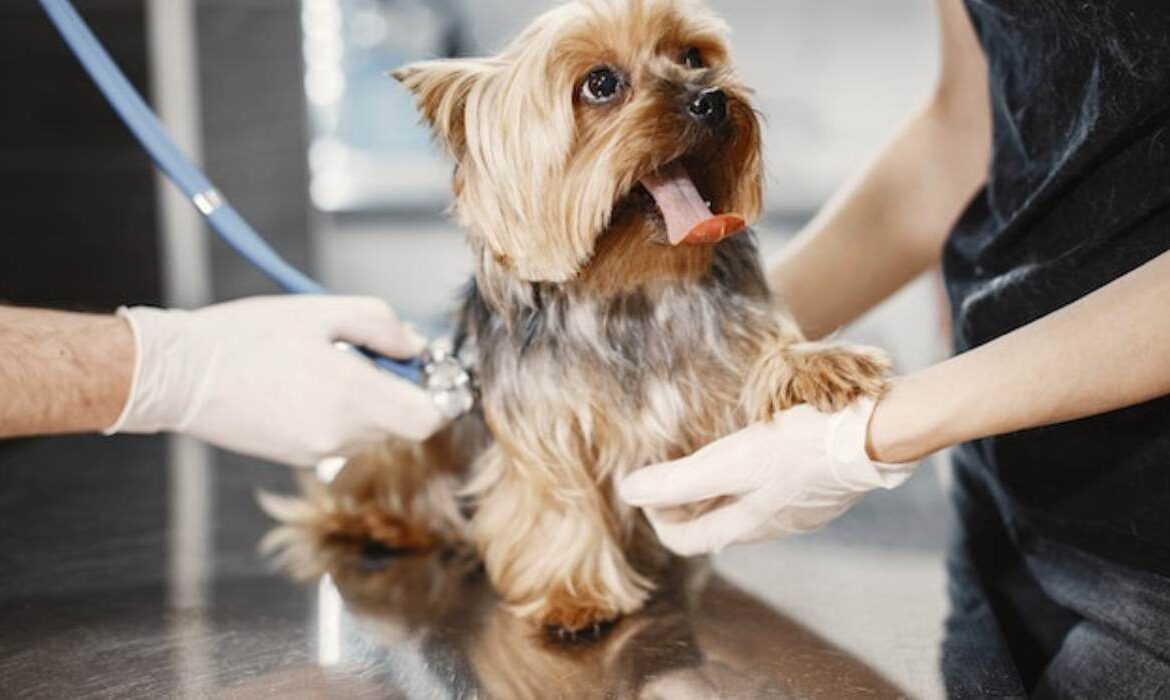Anakie Vet: Quality Care for Your Furry Friends

Looking for top-quality veterinary care for your furry friends? Look no further than Anakie Vet! Our team of experienced veterinarians and support staff is dedicated to providing personalized care. To keep your pets healthy and happy. From preventive care to surgery and dental services. We offer a wide range of services to meet your pet’s unique needs. Contact us today to schedule an appointment!
Anakie Vet provides top-quality medical care for your pets. From routine check-ups to surgical procedures, our team of highly skilled veterinarians. The support staff are dedicated to ensuring the health and happiness of your furry friends. Contact us today to schedule an appointment and experience the best care for your pets.
Preventive Dental Care for Pets
Preventive dental care is crucial to maintain good oral health in pets. This includes regular brushing of your pet’s teeth with a pet-safe toothbrush. Toothpaste, providing dental chews and toys to help remove plaque and tartar. Scheduling regular professional dental cleanings with your anakie vet. By implementing preventive dental care measures, pet owners can help prevent dental disease. Which can lead to painful oral infections and other health problems. Consult with your veterinarian to develop a dental care plan that is tailored to your pet’s individual needs.
Brushing your pet’s teeth
Brushing your pet’s teeth is an essential part of their dental care routine. It helps remove plaque and tartar buildup that can lead to tooth decay and gum disease. To brush your pet’s teeth, use a soft-bristled toothbrush and pet-safe toothpaste. Begin by introducing your pet to the toothbrush and toothpaste gradually, allowing them to smell and taste the toothpaste. Next, gently lift their lip and brush their teeth using circular motions. Focus on the outer surfaces of the teeth, as this is where plaque and tartar typically accumulate. Be patient and make the experience positive with praise and treats. Brushing your pet’s teeth at least 2-3 times per week can help maintain good oral health and prevent dental disease.
Dental chews and toys
Brushing your pet’s teeth is an essential part of their dental care routine. It helps remove plaque and tartar buildup that can lead to tooth decay and gum disease. To brush your pet’s teeth, use a soft-bristled toothbrush and pet-safe toothpaste. Begin by introducing your pet to the toothbrush and toothpaste gradually, allowing them to smell and taste the toothpaste. Next, gently lift their lip and brush their teeth using circular motions. Focus on the outer surfaces of the teeth, as this is where plaque and tartar typically accumulate. Be patient and make the experience positive with praise and treats. Brushing your pet’s teeth at least 2-3 times per week can help maintain good oral health and prevent dental disease.
Professional dental cleanings
Professional dental cleanings performed by a anakie vet are an important part of your pet’s dental care. During a dental cleaning, your pet will be placed under anesthesia to ensure their comfort. Safety while the veterinarian performs a thorough cleaning of their teeth and gums. This includes removing any plaque and tartar buildup and addressing. Any other dental problems that may be present, such as loose or damage teeth. Dental cleanings are typically recommend annually for most pets. Although some may require them more frequently depending on their individual needs. Regular dental cleanings can help prevent dental disease and improve your pet’s overall health and well-being. Talk to your veterinarian about scheduling a dental cleaning for your pet.
Signs of Dental Problems in Pets
It’s important for pet owners to be aware of the signs of dental problems in their pets. Some common signs of dental problems in pets include bad breath, discolored. Loose teeth, difficulty eating or chewing, and pawing at the mouth or face. Other signs may include drooling, bleeding or inflamed gums, and a reluctance to eat or play with toys. If you notice any of these signs, it’s important to schedule a dental exam with your anakie vet as soon as possible. Ignoring dental problems can lead to more serious health issues. Such as infections, tooth loss, and even damage to internal organs. With prompt attention and treatment, many dental problems in pets can be effectively managed and prevented from progressing.
Bad breath
Bad breath, also known as halitosis, is a common sign of dental problems in pets. It is often caused by a buildup of bacteria in the mouth, which can lead to tooth decay, gum disease. Other dental issues. If your pet has bad breath, it’s important to schedule a dental exam with your anakie vet to determine. The underlying cause and address any potential problems. In some cases, bad breath may be a sign of more serious health issues, such as kidney disease or diabetes. Regular dental cleanings, along with a good dental care routine at home, can help prevent bad breath. Maintain good oral health in pets. If you notice persistent bad breath in your pet, don’t ignore it. Contact your veterinarian to schedule an exam and help your pet maintain a healthy mouth and fresh breath.
Discolored or loose teeth
Loose teeth or Discolored can be a sign of dental problems in pets. Discolored teeth may indicate tooth decay, while loose teeth may be a sign of gum disease or other dental issues. It’s important to schedule a dental exam with your veterinarian if you notice any discolored or loose teeth in your pet. Ignoring these signs can lead to more serious dental problems, including infections, abscesses, and tooth loss. During a dental exam, your veterinarian will assess the overall health of your pet’s mouth and may recommend dental cleanings or other treatments to address any issues. Regular dental care, including brushing your pet’s teeth and providing dental chews and toys, can help prevent dental problems and maintain good oral health in pets. If you notice any signs of dental problems, don’t hesitate to contact your anakie vet for an exam and treatment.
Difficulty eating or chewing
Difficulty eating or chewing is a common sign of dental problems in pets. This can be due to pain or discomfort in the mouth caused by tooth decay, gum disease, or other dental issues. If your pet is having difficulty eating or chewing, it’s important to schedule a dental exam with your veterinarian. Ignoring this sign can lead to more serious health issues, such as malnutrition or weight loss. During a dental exam, your veterinarian will assess your pet’s overall oral health and may recommend treatments such as dental cleanings or extractions to address any problems. Providing your pet with a good dental care routine, including regular brushing and dental chews, can help prevent dental problems and maintain good oral health. If you notice any signs of difficulty eating or chewing in your pet, contact your veterinarian to schedule an exam and address any potential dental issues.
Treatment of Dental Problems in Pets
The treatment of dental problems in pets depends on the specific issue and its severity. In general, treatment may involve a combination of professional dental cleanings, medications, and home care. For example, if your pet has periodontal disease, your veterinarian may recommend a dental cleaning under anesthesia to remove plaque and tartar buildup, along with antibiotics or other medications to help manage the infection. If your pet has a damaged or decayed tooth, extraction may be necessary to prevent further infection and pain. In some cases, dental surgery or specialized treatments may be necessary to address more complex dental problems. Home care, such as regular brushing and providing dental chews and toys, can also help prevent and manage dental problems in pets.
Extraction of damaged or infected teeth
Extraction of damaged or infected teeth is a common treatment for dental problems in pets. This is often necessary when a tooth is severely decayed, fractured, or infected, and cannot be treated with other methods such as fillings or root canals. During the extraction procedure, your pet will be placed under anesthesia to ensure they are comfortable and pain-free. Your veterinarian will carefully remove the damaged or infected tooth and clean the surrounding area to promote healing. Your pet may need medication to manage pain and inflammation after the procedure, as well as antibiotics to prevent infection. It’s important to follow your veterinarian’s post-operative instructions carefully to ensure your pet heals properly and avoids complications. After tooth extraction, your pet may need to adjust their diet temporarily, and regular dental care, including brushing and providing dental chews, can help prevent further dental problems.
Treatment of gum disease
The treatment of gum disease in pets often involves a professional dental cleaning under anesthesia, which removes plaque and tartar buildup from the teeth and gum line. In some cases, antibiotics or other medications may be prescribed to help manage the infection. Depending on the severity of the gum disease, your veterinarian may also recommend surgical treatments such as gum flap surgery or gingivectomy to remove diseased tissue and promote healing. Home care, such as regular brushing and providing dental chews, can also help prevent and manage gum disease. It’s important to work closely with your veterinarian to determine the best course of treatment for your pet’s specific dental issues, as untreated gum disease can lead to more serious health problems.
Repair of broken teeth
The repair of broken teeth in pets depends on the severity and location of the break. In some cases, a simple bonding procedure may be used to repair minor chips or cracks. For more extensive damage, such as a broken or fractured tooth, a root canal or extraction may be necessary. If a tooth cannot be saved, extraction may be recommended to prevent infection and pain. In some cases, a crown or cap may be placed over a repaired tooth to protect it from further damage. It’s important to have your pet’s broken teeth evaluated by a veterinarian to determine the best course of treatment. Prompt treatment can prevent further damage and help your pet maintain good oral health.

Home Dental Care Tips for Pet Owners
Home dental care is an important part of keeping your pet’s teeth and gums healthy. Regular brushing is the most effective way to remove plaque and prevent dental problems. Start by introducing your pet to toothpaste and a toothbrush designed for pets, and gradually work up to daily brushing. Dental chews and toys can also help remove plaque and keep teeth clean. It’s important to have your pet’s teeth and gums checked regularly by a veterinarian, and to schedule professional dental cleanings as needed. Other tips for maintaining good oral health include providing a healthy diet and avoiding table scraps or sugary treats. By practicing good home dental care and working with your veterinarian, you can help your pet maintain a healthy, happy smile for years to come.
Tips for brushing your pet’s teeth
Brushing your pet’s teeth can be an effective way to prevent dental problems and keep their mouth healthy. Start by introducing your pet to toothpaste and a toothbrush designed for pets, and gradually work up to daily brushing. Choose a time when your pet is calm and relaxed, and start by gently rubbing your finger along their teeth and gums. Once they are comfortable with this, introduce the toothbrush and toothpaste. Use a circular motion to brush the teeth and gums, and be sure to praise your pet and offer treats as a reward. If your pet is resistant to brushing, there are other options such as dental wipes or sprays that can also be effective. By practicing regular brushing and working with your veterinarian, you can help your pet maintain good oral health.
Choosing the right dental chews and toys
Dental chews and toys can be a great addition to your pet’s home dental care routine, but it’s important to choose the right ones. Look for products that have the Anakie Vet Oral Health Council (VOHC) seal of approval, which indicates they meet certain standards for effectiveness in removing plaque and tartar. Choose chews and toys that are appropriately sized for your pet and their chewing habits, as larger or harder products can cause dental fractures or other problems. Avoid products with added sugars or artificial ingredients, as these can contribute to dental problems. Always supervise your pet while they are chewing to prevent choking or other hazards. By selecting high-quality dental chews and toys, you can help support your pet’s oral health and overall well-being.
Using water additives and oral sprays
Water additives and oral sprays can be an effective way to support your pet’s oral health, especially if they are resistant to brushing or have other dental issues. These products are designed to reduce plaque and tartar buildup, freshen breath, and promote healthy gums. When choosing a water additive or oral spray, look for products that are specifically formulated for pets and do not contain alcohol or other harmful ingredients. Follow the instructions carefully and be consistent with use to achieve the best results. While water additives and oral sprays can be helpful, they should not replace regular brushing or professional dental cleanings. Consult with your veterinarian to determine the best approach for your pet’s individual needs.
Conclusion
Maintaining good oral health is an important part of your pet’s overall well-being. Regular dental care, including brushing, using dental chews and toys, and scheduling professional cleanings as needed, can help prevent dental problems and keep your pet’s mouth healthy. It’s also important to be aware of the signs of dental issues, such as bad breath, loose or discolored teeth, and difficulty eating or chewing, and seek veterinary care as needed. By working with your veterinarian and practicing good home dental care, you can help ensure your pet enjoys a healthy, happy smile for years to come. If you’re looking for a comfortable and supportive seat while running a busy veterinary clinic, investing in the best ergonomic executive office chair could make a big difference in your overall comfort and productivity.









